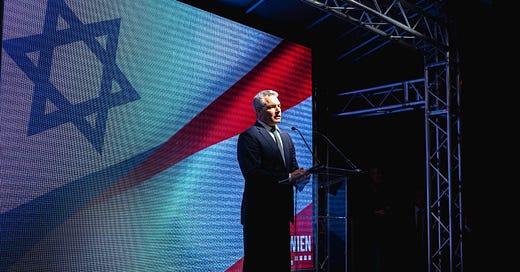Austria, Israel and Hamas
Austria has made clear its solidarity with Israel in the wake of Hamas's invasion of the western Negev on October 7
Servus!
On the morning of October 7, Hamas invaded Israel by land, air, and sea. They unleashed a wave of violence against civilians across the western Negev, conducting massacres at bordering kibbutzim like Kfar Aza, Be’eri, and Nir Oz. 1,400 Israelis are believed to have been killed, while around 199 have been taken hostage by Hamas. Among them were three Austrians with dual citizenship, Austria’s foreign ministry has confirmed. Kurier reported that one of the Austrians was Tal Shoam, 38, who was killed by Hamas on Kibbutz Be’eri and leaves behind two children, aged eight and three.
In the hours and days following Hamas’s invasion, the Austrian government has stood lockstep with Israel. The Israeli flag was raised above the federal chancellery and foreign ministry alongside the Austrian one—the second time in recent memory that Austrian government buildings have been used for this gesture of solidarity. “For Austria it is clear that terror can never be justified. It only ever causes suffering and misery for those affected,” chancellor Karl Nehammer said October 9. “Our thoughts are with the families who are missing or have lost their loved ones.”
On October 11, the Jewish Community of Vienna organized a memorial event for the victims of Hamas’s invasion including the hostages. Among those who spoke at the event were Nehammer, vice-chancellor Werner Kogler, president of the Austrian parliament Wolfgang Sobotka, Vienna mayor Michael Ludwig, and NEOS leader Beate Meinl-Reisinger. Support both for Israel and the local Jewish community, then, came from the upper echelons of the national leadership and spanned the political spectrum. 3,000 people are estimated to have attended the event.
Indeed, all parliamentary parties signed onto a joint declaration of support for Israel last week. It read in part: “Our thoughts are with the people of Israel. The brutal attack on Israel by the terrorist organization Hamas must be condemned in the strongest possible terms. [Austria] has a special responsibility to stand shoulder to shoulder with Israel in the fight against terror.” When one considers that, 40 years ago, Austria was Yasser Arafat and the Palestine Liberation Organization’s principal supporter in western Europe at a time when neither recognized Israel’s right to exist, this declaration signals a complete transformation in Austrian foreign policy.
At the same time as there was a pro-Israel demonstration outside the federal chancellery, a pro-Palestinian protest took place on the square by St. Stephen’s Cathedral, even though such a gathering had in theory been banned by police. There have been a number of these demonstrations since the war began either in the center of town or out in the tenth district, organized, Profil reports, by Palestine Solidarity Austria, an umbrella organization for far-left, pro-BDS groupuscules. While they haven’t necessarily attracted large numbers of people, journalists reported calls to violence and “antisemitic fantasies of extermination” coming out of these protests.
The events of October 7 were “not a war, but rather a pogrom,” the Austrian Jewish filmmaker Ruth Beckermann told Profil. “As long as Israel and Jews all over the world are threatened by an enemy with an absolute will to destroy, we [Austria] have a basic obligation” to both precisely because of Austrian history, Hans Rauscher posited in the Standard. But now a new phase in the war is about to begin, and, he went on, “it is also important for enlightened, humanitarian-minded Austrians not to forget the legitimate concerns of those Palestinians who are victims of a general infatuation with violence.” Right now, Israel has Austria’s—and Europe’s—support and solidarity. But with hundreds of thousands of Palestinians on the move and Israeli tanks amassing on the border with Gaza, how long will that last?
Bis bald!
Thank you for subscribing to the Vienna Briefing. Every recommendation helps, so if you know someone who might be interested in reading this newsletter, consider sharing it with them today.
The Vienna Briefing is a reader-supported publication made possible by your donations. If you would like to contribute to my work, think about sending me a tip via PayPal.
Karas Cuts Ties
First vice-president of the European Parliament Othmar Karas announced Thursday he would not stand as a candidate for the ÖVP in next year’s European elections, criticizing his party’s shift away from the political center. Neither would run as the lead candidate for his own list, the MEP clarified.
Slovakia Controls Extended
Austria has extended its border controls on its frontier with Slovakia until November 2. The checks were put in place on October 4 in order to deal with irregular migration and human smuggling, according to the interior ministry.
9 Percent Gap
Employers and unions in the metal and machine building industries are at an impasse over the terms of a new collective bargaining agreement. While labor has demanded an 11.6 percent pay increase for next year, industry has countered with a rise of 2.6 percent and a one-time bonus worth €1,050.




